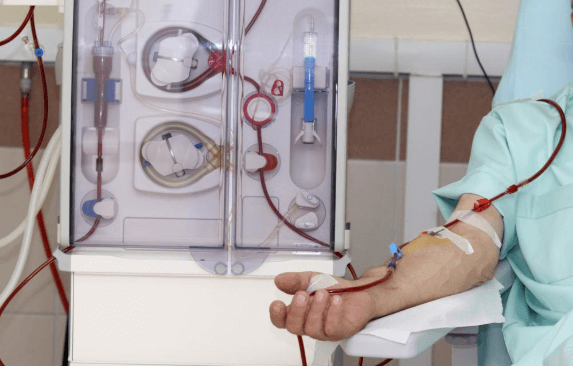What to Expect When Undergoing Dialysis Treatment

Dialysis is an important treatment when your kidneys can no longer correctly filter the fluid in your body. Dialysis may sound scary at first, but when you learn about the procedure and what goes into it, it can take the stress off of you and get you ready for this life saving procedure.
Understanding Dialysis
Dialysis is a medical treatment made to take over for the proper functioning of your healthy kidneys, which means removing waste and excess fluids and toxins from your blood. There are two main types of dialysis:
- Hemodialysis: There’s a machine that filters your blood outside your body. Performed at a dialysis center or sometimes at home, depending on the patient’s medical condition and personal preference.
- Peritoneal Dialysis: This method cleans your blood inside your body using a special fluid called dialysate that is slowly introduced through a catheter into your abdominal cavity.
People most often need dialysis if they have end stage kidney disease or kidney damage serious enough to have led to the condition because of diabetes or hypertension.
See also: How Quick Loans for Bad Credit Impact Your Financial Health
Getting Ready for Dialysis Treatment
A healthcare team will assess your condition and decide what’s the best treatment before you start dialysis. Preparing for dialysis often includes:
- Placement of a Dialysis Access Point: Hemodialysis involves creation of some vascular access point (arteriovenous fistula, catheter etc). When you do peritoneal dialysis, a catheter, or tube, is surgically implanted in your abdomen.
- Lifestyle Adjustments: Your doctor may suggest that you need to change what you eat because you should eat fewer things with salt, potassium, phosphorus, or any other chemicals. In addition, to most effective dialysis, it is also important to stay hydrated and manage medications. A nephrologist in Lahore can help guide you in making the right dietary choices and managing your overall kidney health.
It’s in the preparation phase that gets your body prepped to be able to sit regularly for dialysis sessions.
The Dialysis Process
Understanding what happens during a dialysis session can help you feel more at ease:
- Before the Session: You have your vital signs checked. We also make sure that our dialysis access point is working properly.
- During the Session:
- During hemodialysis, your blood is removed through the access point, filtered by a dialysis machine and then returned to your body.
- With peritoneal dialysis dialysate is added to the space around your abdomen and waste passes from the blood into the dialysate where it can be drained.
- Duration and Frequency: Three to four hours, three times a week is the norm for hemodialysis sessions. Per session, it is less time intensive but peritoneal dialysis is done more frequently, i.e. daily.
While fatigued, the process is usually well tolerated with proper medical care.
Potential Side Effects
Just as any medical treatment, dialysis can have side effects. Consult the best nephrologist in Rawalpindi to manage and mitigate these effects. Some of the most common include:
Short-term Effects:
- Caused by changes in fluid and electrolyte levels that cause muscle cramps.
- May cause nausea or dizziness, especially if too much fluid is pulled out too quickly.
- Low blood pressure during, or shortly after the session.
Long-term Considerations:
- Infection or skin irritation around where they entered your body.
- Can place physical stress on the body, and fatigue.
These side effects can be managed or prevented with your doctor’s help.
Emotional and Mental Adjustments
In many ways dialysis will make your life different, and that often impacts your emotional and mental well being. First, it’s normal to feel overwhelmed or anxious. Here are some ways to cope:
- Reach out to family, friends or support groups. There is a lot to be said for sharing your experiences with others who know what you are going through.
- If depression or anxiety feelings persist, think of professional counseling.
- Try to focus on small positive steps, like keeping up hobbies, or doing something that makes you happy, etc.
- Physical health support during dialysis is important, but also mental resilience.
Life During Dialysis
Maintaining a normal life while undergoing dialysis is possible with some adjustments:
- Work-Life Balance: Dialysis patients often continue to work. But you can schedule sessions around your work hours or choose home dialysis.
- Dietary Changes: Your doctor or dietitian will recommend the diet that you need. It often involves limiting sodium, potassium, and phosphorus; and making sure enough protein is eaten.
- Exercise: Physical activity such as walking, or yoga can help overall health and decrease fatigue.
One of the best things to do when you are undergoing cancer treatment is adopting a proactive approach towards your self care that can definitely boost your quality of life while you are at it.
Conclusion
Dialysis is an important treatment that can improve and extend your life. However, it may be overwhelming at first, but yet if you know what to expect and stay updated, you can somewhat feel confident in the process. Your healthcare team is always there to help you. To thrive on dialysis treatment it is important to stay active, lead a healthy lifestyle and maintain open communication.




